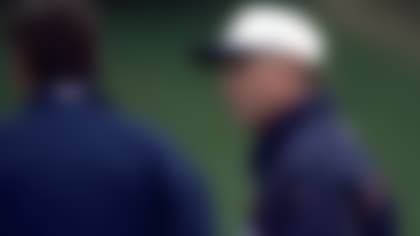(Note: The following story appears in the Super Bowl XLII Official Program.)
For any given play of an NFL game, eight or nine of the 22 players on the field are linemen. That's between 36 and 40 percent of the lineup.
Yet in the first 41 years of the Super Bowl, only three defensive linemen have been named the game's Most Valuable Player ... and two of them had to share the honor.
Of course, that's three more than their counterparts on the offensive side of the ball.
"Yeah, that's a pretty short list," quips Randy Cross, starting center on three of the San Francisco 49ers' five Super Bowl-winning squads.
It's easy for players such as Randy Cross to be overlooked. Hall of Fame quarterback Joe Montana was named MVP of Super Bowl XIX, famously outdueling fellow Hall of Famer Dan Marino. But did you know the 49ers still hold the Super Bowl record they set in that game with 16 rushing first downs? You could make a case that the offensive line collectively was the MVP of that win, grinding it out and eating time off the clock-keeping the ball out of Marino's hands.
And guess what? The 49ers banged out 14 more rushing first downs in their Super Bowl XXIV victory over the John Elway-led Broncos. Of course, Montana once again was voted MVP.
"You rarely get an offensive lineman recognized that way," says former Bears defensive end Richard Dent, who is among those select defensive linemen to be named MVP, an honor he earned after spearheading his team's defensive annihilation of the Patriots in Super Bowl XX. "Look at what the Colts' offensive line did in last year's Super Bowl. The MVP award went to the quarterback, but it was the running game that really made the difference."
Indeed, backs Joseph Addai and Dominic Rhodes both had big games, combining for 190 rushing yards. The line's pass protection was pretty good, too. Peyton Manning threw 38 times against the Bears' ferocious defense and was sacked just once.
Manning ended up being MVP, though the honor could have easily gone to Addai, who had 143 combined yards from scrimmage. But Phil Simms and Jim Nantz, calling the game for CBS, did at least mention the possibility of the Colts' offensive line -- a group led by All-Pros Jeff Saturday (at center) and Tarik Glenn (left tackle) -- sharing the Pete Rozelle Trophy.
"That was probably one of the few times it's ever been mentioned," says Cross, "and it was only mentioned in passing, laughingly, by the broadcasters because they knew it was not going to happen."
As Simms recalls, it was more a matter of calling attention to the Colts' offensive line, because when an offense is loaded with all-pros at the skill positions, it only stands to reason that the line must be doing a good job.
"You could have made a case for the Colts' offensive line to be MVP," says Simms. "And they might have deserved it, but you couldn't get anybody to think like that. To give it to the offensive line as a unit? I've talked about it during games, but you'd have an outcry."
When the Bears demolished New England, 46-10, it was impossible to overlook Chicago's defense, and Dent was the obvious choice with 1½ sacks and two forced fumbles. Overall, Chicago limited the Patriots to a lowly seven rushing yards, by far a Super Bowl record. But in that game, New England trailed by 20 at halftime and by 41 after three quarters, so the ground game had pretty much been abandoned by the second half.
Perhaps more impressive was the previous record, set in Super Bowl IX by Pittsburgh's Steel Curtain defense. Led up front by Joe Greene and L.C. Greenwood, the Steelers held running back Chuck Foreman and the Minnesota Vikings to 17 yards rushing in a much closer contest. In that 16-6 victory, Pittsburgh also set the Super Bowl record for fewest yards allowed from scrimmage (112) and even netted the first safety in the game's history when Dwight White tackled Fran Tarkenton in the end zone. So, naturally, the MVP was running back Franco Harris (though Pittsburgh's defensive front did eventually make the cover of Time magazine).
Super Bowl XI might have provided the ultimate disrespect to the guys on the line. The Vikings were once again the victims, this time being dominated by an opponent's offensive front. Led by Hall of Fame linemen Art Shell and Gene Upshaw, the Oakland Raiders set a then-Super Bowl record with 266 rushing yards in their 32-14 triumph. Six different backs carried the ball for Oakland and three of them had at least one carry of 10 or more yards. Clearly, the offensive line was the key to this victory. So who was named MVP?
Receiver Fred Biletnikoff, who caught four passes for 79 yards and zero touchdowns.
"It wasn't a surprise," says Shell. "It was going to be him or the quarterback. That's the nature of the game. Who else wins it?"
Shell says this with a light-hearted chuckle, adding that the idea of him and his linemates earning Most Valuable Player honors never occurred to him ... at least at the time.
"Based on what I've heard over the years," he says, "Gene and I got a lot of votes. I don't know how many, but I've heard that. And I thought, 'You've got to be kidding me.' "
One year later, linemen finally got some extra credit. In the Cowboys' 27-10 win over Denver in Super Bowl XII, the defense forced a then-record eight turnovers, sacked Broncos quarterback Craig Morton four times, and held Denver to a meager 35 yards passing. While anyone on that side of the ball could have been chosen the MVP, the award went to two of the principals: defensive end Harvey Martin and defensive tackle Randy White.
Dent would later join Martin and White on the MVP podium, but offensive linemen are still waiting to get their due. A big part of the problem, of course, is that they don't have any statistics to hang their helmets on.
"There's always something quantifiable to define a great defensive lineman," says Cross. "Guys like Richard [Dent] and Randy White and Dan Hampton; you can go on down the list of all the great linemen through the years. You can look at tackles for loss and sacks and things like that. [But] there's nothing quantifiable for offensive linemen in the way of numbers that people can define."
And in the case of the 49ers, there were so many offensive numbers that could quantify what was being done by the likes of Montana, Roger Craig, Jerry Rice, and others. It's not as if offensive linemen never get any credit; it just so happened that San Francisco's offensive line was often overshadowed.
"We were the 'other' line when we played Cincinnati [in Super Bowl XVI], because they had a future Hall of Famer in Anthony Muñoz anchoring a great offensive line," says Cross. "In our second Super Bowl, we faced Dan Marino and this state-of-the-art offense. Then we faced Muñoz and the Bengals again in Super Bowl XXIII. So we were sort of the other group. But when we think about it, we look back glowingly.
"And you can look at some of the other teams from that era…the Bears had a pretty good offensive line blocking for Walter Payton. Then there were those Chargers' offenses -- Air Coryell -- and the Giants' offense when they won the Super Bowl and had those great years.
"For some reason, I guess there weren't any really good linemen on any of those lines," adds Cross tongue-in-cheek, "because not many of them are remembered terribly fondly.
"When you get to the Super Bowl and you're in that atmosphere, and people suddenly decide they've got to write about you, they sort of do it grudgingly. But that's OK. That's part of your lot as an offensive lineman."
Dent, who faced the 49ers' offensive line several times in NFC playoff games during the '80s, never underrated that group.
"When you think back to all those Super Bowls San Francisco won, people would say, 'Oh it's the system.' But they ran traps well, they ran fake traps well, they ran draws well. It was quick snaps and timing."
Cross and Dent played in the era that some believe best defined the importance of talented linemen. Teams from the NFC dominated the Super Bowl back then, and it had a lot to do with toughness up front.
"The physical dominance of that decade was highlighted by the guys on the line," says Cross, who also points out the 49ers had a pretty strong defense that was sometimes overlooked because of the offense's ability to score.
Similarly, when one brings up the "Hogs" -- Washington's great offensive line that helped them to Super Bowl victories in 1982, '87 and '91-both Dent and Cross quickly mention the presence of Dexter Manley and Charles Mann on the Redskins' defensive side.
"Once you get into the red zone, you've got to be able to run the ball," says Cross. "AFC teams (back then) could throw the ball all over the place, but once the field got short -- if your offensive line couldn't pick up the short yards or your defensive line couldn't stop them -- it was pretty much over."
So which side of the line is more important when it comes to the Super Bowl?
"That depends on whether you want your offense on the field or your defense on the field," answers Dent.
Says Cross: "The reality is that if you don't have it on both sides, I don't know if you have much of a chance. There haven't been too many one-sided teams winning championships."
"The game really can't be played without the guys up front," adds Dent, quick to give equal billing to both sides of the line. "Without them, it would just be a passing scrimmage."
Craig Ellenport is a senior editor at NFL.com and NFL Publishing.



